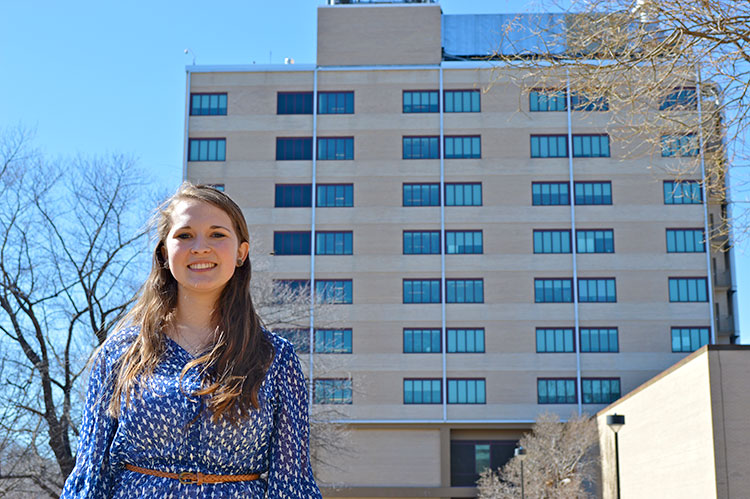
Coming to UNL from the University of Georgia by way of Watkinsville, Ga. was an unexpected detour in the roadmap of Katie McCollum's life.
"To be honest, I was excited to explore a new place but wary of the new location, as I'm sure most people from Nebraska would be of moving to Georgia," said McCollum, a wildlife ecology graduate student.
As an undergrad, McCollum traveled to Botswana on a Study Abroad trip led by John Carroll, then a professor at Georgia's Warnell School of Forestry and Natural Resources and now director of UNL's School of Natural Resources.
"It was (then) that I discovered my passion for international wildlife conservation and management," McCollum said.
Influenced by her time in Botswana, McCollum pinned down an idea for a master's thesis that would focus on the kori bustard, a large bird native to eastern and southern Africa.
As she and Carroll worked out thesis project details, Carroll was offered the SNR director's job at UNL.
"I was given the option of staying at UGA and working on another project or continuing with Dr. Carroll and moving out here to do my master's work," McCollum said. "It's hard for me to ever turn down an adventure, so here I am."
That adventure involves returning to Botswana this summer to further her research on the kori bustard. Now she's turning to crowdsourcing to help make it a reality.
McCollum said that the species caught her attention for several reasons. First, it's the heaviest flying bird in the world, with some adult males standing three to four feet tall and weighing as much as 40 pounds.
"Watching them take off is like watching a Boeing take off," she said. "They need a pretty long runway."
Second, the species is culturally significant in Botswana. Some of the locals use them as their 'token' animal – similar to a spirit animal – and they are one of the national birds of Botswana, she said.
Third, little research has been done on the wild populations of the kori bustard.
"(That) means there is a wealth of knowledge just waiting for someone to collect and analyze."
Because of a large decline in population, the kori bustard was recently uplisted to "near threatened" on the International Union for Conservation of Nature's Red List, which assesses the conservation status of species, subspecies and selected subpopulations on a global scale.
"Now is the time when research is most needed to stop the current decline and provide a future for this species," McCollum said.
During her trip, McCollum will study the population movements of the kori bustard to better understand the effects that seasonality and resource utilization have on an individual bird's location.
"By gathering information about kori bustard movements, we will be able to make more informed conservation and land management decisions in order to protect this unique species," McCollum said.
As with most international travel, funding a trip to Botswana is no cheap endeavor. So McCollum got creative: She organized an online Indiegogo campaign, complete with a web page, video and redeemable "perks" – like handwritten postcards and handwoven baskets – for people who contribute to her fund.
"I found that others had been using Indiegogo campaigns to fund entire wildlife research projects for many species in many countries, so I figured I'd give it a shot," she said.
McCollum has raised about half of her $2,000 goal. Anyone interested in helping her reach that goal can do so by clicking here and donating. The campaign ends March 28.
For Carroll, exposing students to the increasingly globalized nature of conservation and research is essential.
"The world is so much smaller and interconnected now," Carroll said. "Even if a student is never going to work in international conservation, direct experience in other parts of the world brings home the idea that what we do here impacts all these other places."
This trip is the beginning of McCollum's master's field research, so it's a big part of her professional goals, she said.
"By donating to this campaign you will be providing crucial monetary support to (my) research project. I can't even begin to say how thankful I am to everyone who has already donated or shared the campaign with their friends – I'm extremely grateful."
— Mekita Rivas, Natural Resources
More details at: http://www.indiegogo.com/projects/kori-bustard-conservation-in-eastern-botswana